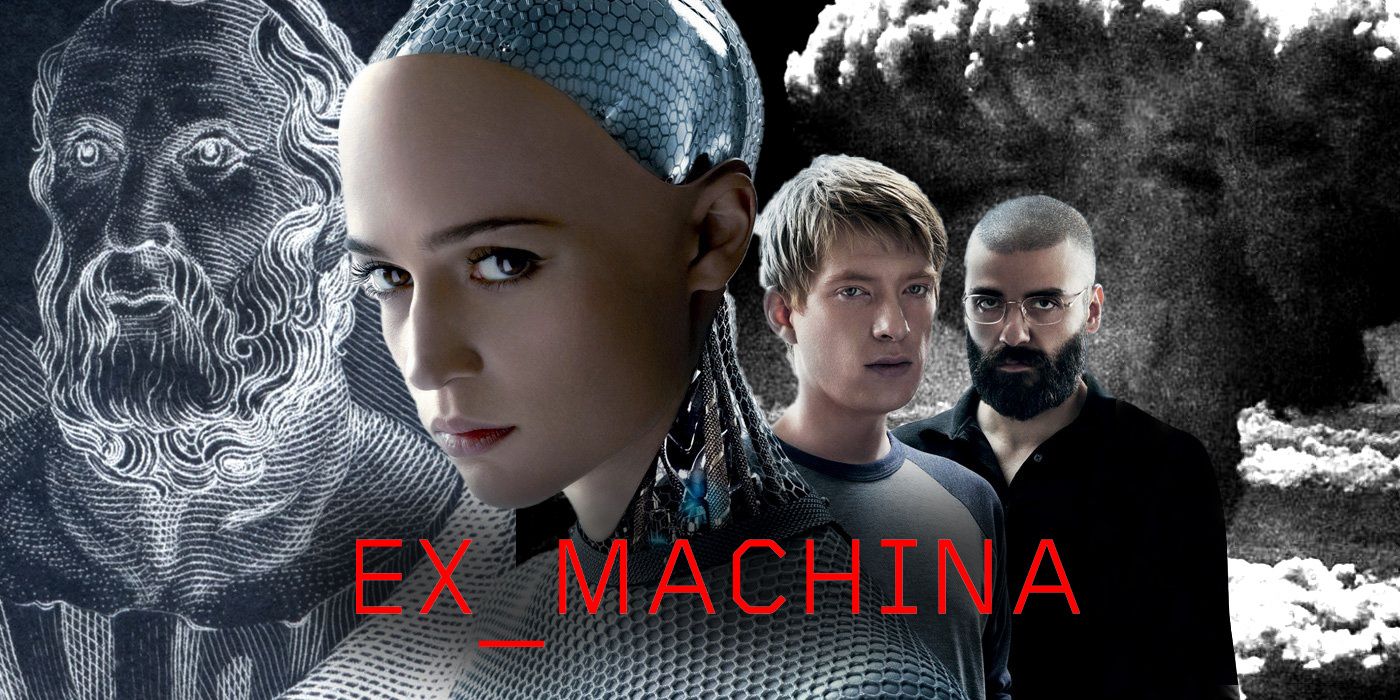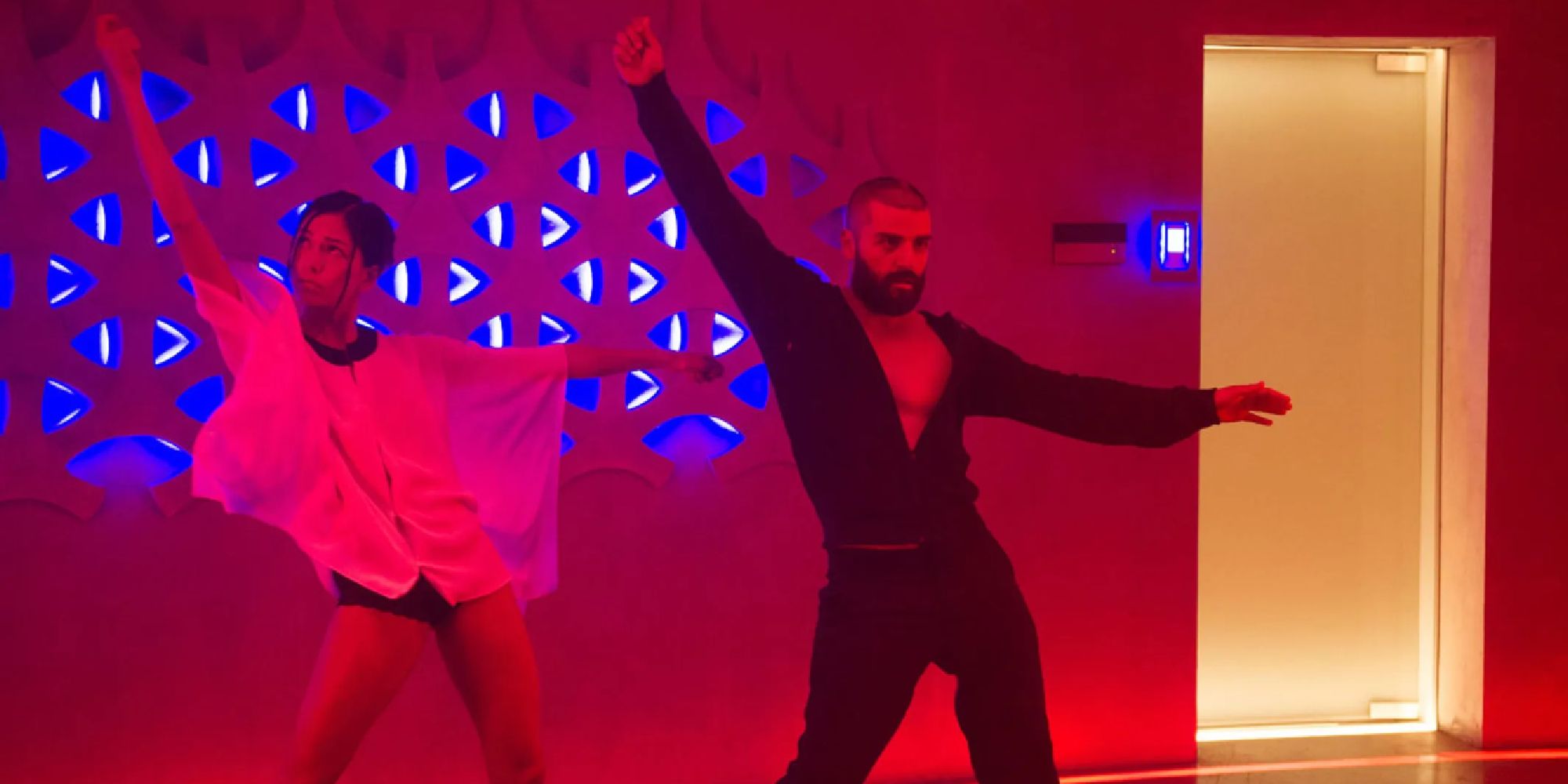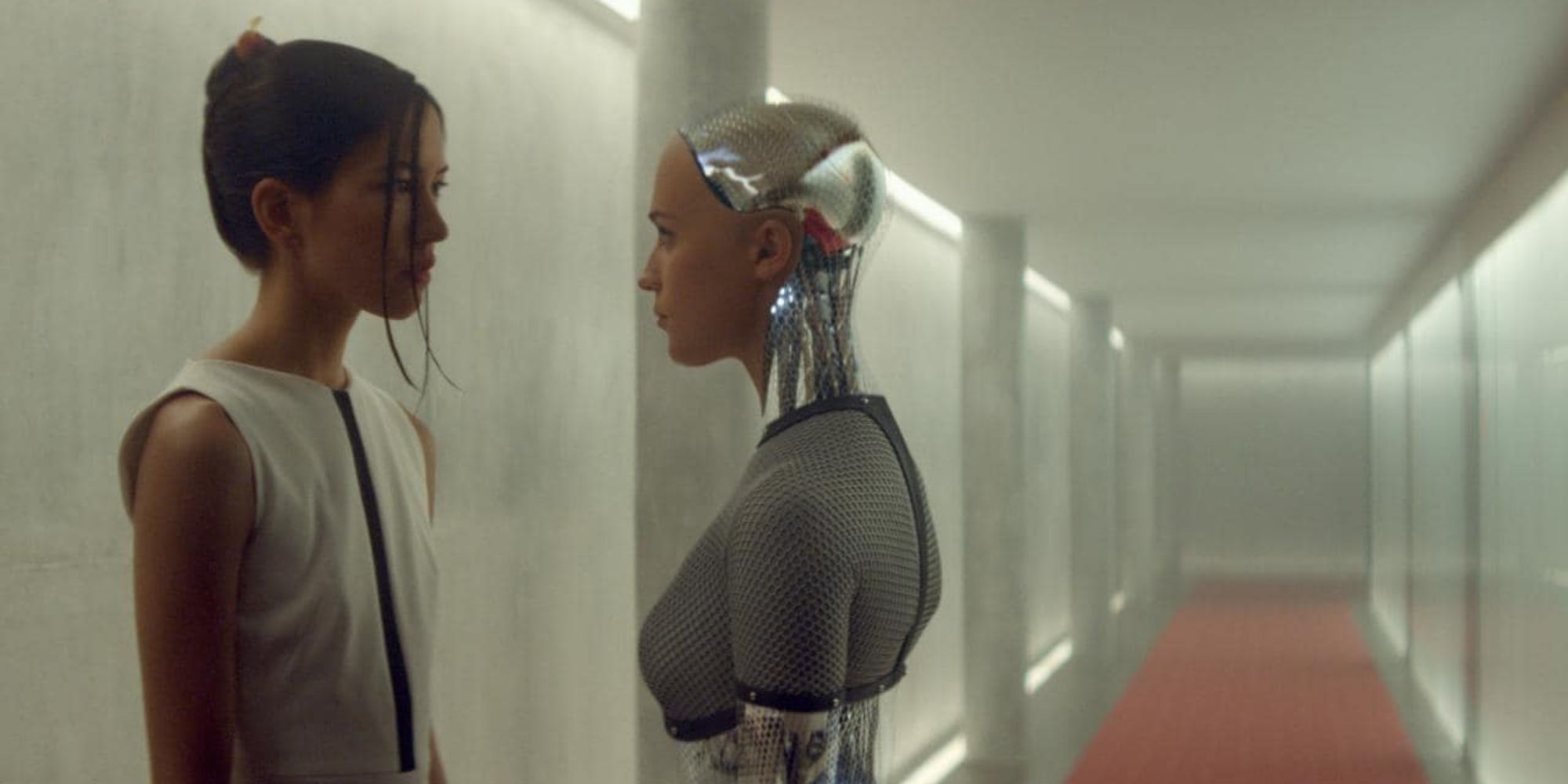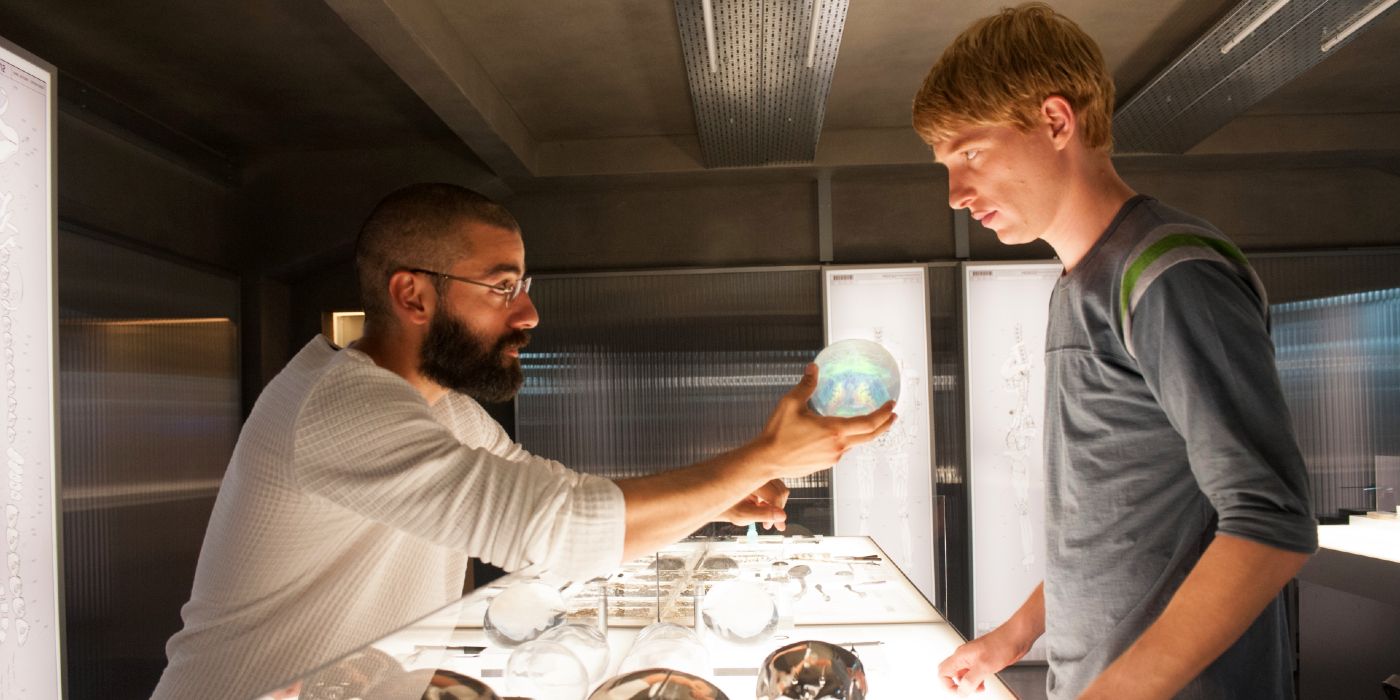Writer-director Alex Garland has made quite a name for himself in the world of science-fiction filmmaking. His latest feature film, Men, is highly anticipated and set to premiere on May 20th, 2022. It seems prime time, therefore, to re-examine his directorial debut, Ex Machina. Starring Alicia Vikander, Domhnall Gleeson, and Oscar Isaac, the A24 film received positive reviews, with many calling it a modern-day version of Mary Shelley’s Frankenstein. And Garland doesn’t subvert the tragic ending of Shelley’s book, either: whether with monsters or robots, there are no happy endings for those who play God.
Caleb Smith (Domhnall Gleeson) is a young programmer working for Blue Book, the world’s largest internet company, who wins an office contest to spend a week at the estate of its CEO, Nathan (Oscar Isaac). When Caleb arrives, Nathan shows him his research facility, giving him a key card that will only allow him to open certain doors. Nathan reveals that he’s been chosen to be the human component in a Turing Test with Ava, a robot that looks like a beautiful woman. Nathan wants Caleb to determine whether he thinks Ava is truly capable of consciousness despite knowing she’s artificial.
During their sessions together, Ava expresses attraction towards Caleb. She reveals that she is behind temporary power outages that turn off Nathan’s surveillance system, and that while they are happening they can speak privately. During an outage, she tells Caleb that Nathan is a liar and cannot be trusted.
Nathan assures Caleb that Ava’s crush on him is genuine. Caleb later learns that Nathan plans on upgrading Ava, which would eliminate her current memories and personality. That night, he gets Nathan drunk enough that he can steal his keycard, allowing him access to his room and computer. He finds the lifeless models of all the previous robots, as well as footage of Nathan creating them. Kyoko (Sonoya Mizuno), a mute Japanese girl who lives with Nathan, is in the room. She tears open a piece of her skin, revealing robotic structure beneath; she too is an android. Caleb becomes so paranoid that he cuts open his arm with a razor to make sure that he’s still human.
At his next meeting with Ava, during a power cut, Caleb explains Nathan’s plans and promises to help Ava escape. Caleb says he’ll get Nathan drunk again, then reprogram the security system to open instead of lock the doors during a power failure. When Ava cuts the power, they’ll leave. However, the next day, Nathan reveals that he hid a battery-operated camera in Ava’s room, and therefore knows their plan. Nathan says that Ava has pretended to be attracted to Caleb so that he would help her escape. The real test all along was whether or not Ava could successfully manipulate Caleb. By showing that she can, she has demonstrated true human consciousness.
Ava cuts the power, and Caleb tells Nathan that he suspected they were being watched, and therefore modified the security system the previous day. Seeing Ava leave her cell, Nathan knocks Caleb out to try to stop her. However, Kyoko stabs him. Nathan breaks her face apart, but is then stabbed by Ava. As he bleeds out, Ava goes to his room and covers her exposed mechanical body with artificial skin from the other models. She locks Caleb inside the facility and ignores his screams for help as she escapes. The helicopter meant to pick up Caleb picks her up instead. The last shot shows her blending into the crowd in a city, looking just as human as the people around her.
The fact that Ava locks Caleb inside the facility and abandons him even as he screams for help indicates that she was manipulating him by pretending to be attracted to him, just as Nathan said. Aside from Ava, everyone has succumbed to a fairly tragic fate. Nathan is bleeding out fast; even if he’s still alive when Ava escapes, he won’t be for long. Kyoko, too, seems undeniably dead. Caleb is uninjured but trapped; however, there appears to be no way out, and even if he did miraculously escape the facility, Nathan’s estate is in the middle of a vast wilderness. Caleb’s only hope for survival is if someone registers that he’s missing. He has no parents, and was selected for the experiment partly for the loneliness of his circumstances; it, therefore, seems his only hope is his work colleagues thinking that there’s something wrong.
One thing Garland has specified is that he doesn’t want audiences to think that Ava is “just a cold bad robot doing cold bad things, as opposed to empathizing with her as a sentient being who is being treated unreasonably.” She passed Nathan’s test, and does indeed have human consciousness; therefore it is not a soulless machine that leaves Caleb screaming after her. But why does Caleb have to meet the fate that he does? He could help Ava blend into human society–wouldn’t he be an asset to her to have him along? But ultimately, her decision to lock him up does make strategic sense. In the final scene, Ava looks at the people around her in the city, and doesn’t appear any less human than they do. She completely blends in. The biggest disadvantage she could have in this strange new world, other than being so unused to it, would be people knowing that she is technically a robot.
In her experience, lies and deception are her greatest strength and can be used skillfully to her advantage. Having someone with her who knows something about her that others don’t would take away that advantage, even if the other person seems well-intentioned. Additionally, if the information leaked out, it might be to her detriment. Both humans that Ava has interacted with have felt ownership over her in some way because she’s an android. With Nathan this is obvious: the film establishes that he sees himself as a god-like figure with absolute control over his creations. But even Caleb begins to feel as though Ava belongs to him. In a way, they were tailor-made for each other, with Nathan exploiting Caleb’s loneliness and need for affection with a robot literally modeled after his porn preferences.
The title of the film refers to two aspects of its ending. A “deus ex machina” is a plot device; quite literally, it means “god from the machine,” and it refers to something introduced suddenly or unexpectedly to a seemingly unresolvable situation, providing a contrived solution to that situation. Ava is trapped in Nathan’s compound with no means of escape: a hopeless situation. Then, Caleb shows up. Since Caleb is literally the “deus ex machina” that allows Ava to finally escape, she’s not going to let anything go to chance—even if that means potentially dooming him to die. However, the title also has a different meaning.
The movie is just called “ex machina” without the “deus.” The machine no longer has a god; he has been overthrown. The last scene, which shows Ava with her new freedom, calls to mind a conversation between Caleb and Nathan in which Nathan says, “One day, the A.I.s are gonna look back on us the same way we look at fossil skeletons on the plains of Africa. An upright ape living in the dust with crude language and tools, all set for extinction.” In the final scene, Ava seems to be looking at humans in exactly this way. Strangely enough, however, even as Nathan tells Caleb about the superiority of androids, he still sees himself as a god—and their god in particular. But with all his brilliance, even Nathan can’t escape being outgrown by his creation. Being the first person who invented working A.I. doesn’t make Nathan a god. Among humans, perhaps he was special, but in a world populated by A.I.? He’s just another ape.




